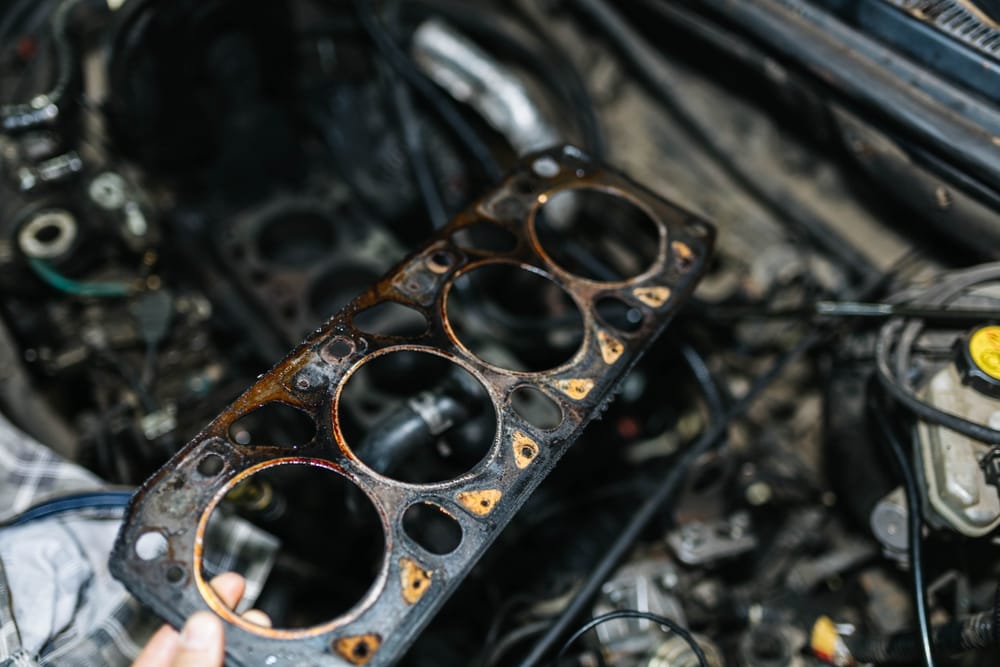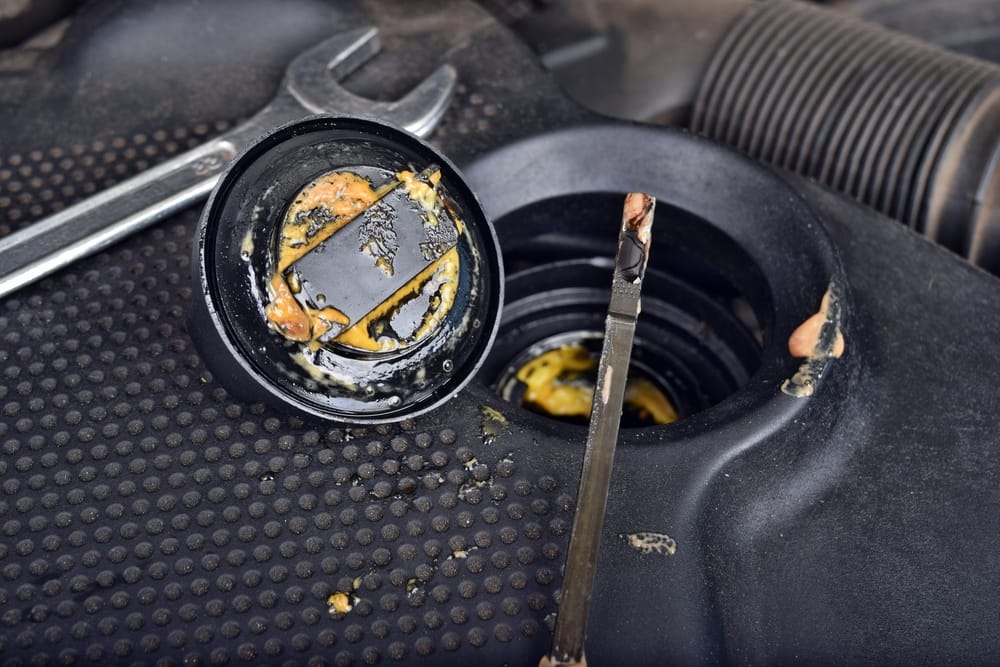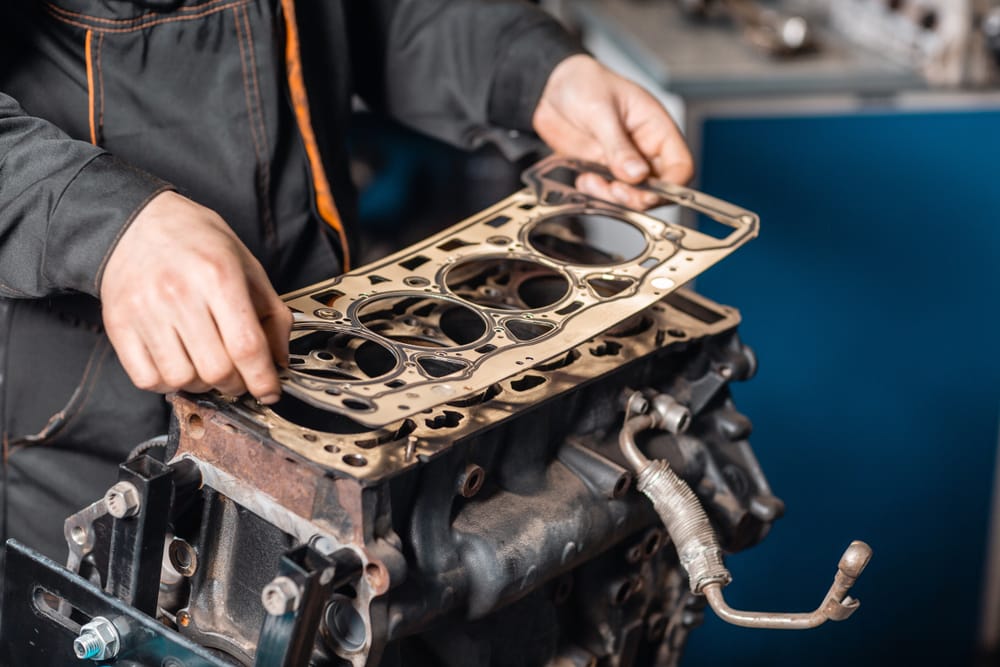A car with a blown head gasket should be checked by a mechanic as soon as
possible. However, you may need to use your car before that happens.
A car will usually still start with a blown head gasket. However, it should
still run if the coolant isn't flooding the engine's cylinders. There is a
high risk of severe damage to your engine if you do this, though, so
consider that.
Below are some signs you should watch out for and what can happen to your
engine if you ignore a potential problem with your head gasket.
 A mechanic holding a damaged head gasket.
A mechanic holding a damaged head gasket.
What Does A Head Gasket Do?
The head gasket may not look like much on its own, but it is a critical
part of your car's engine.
This thin piece of metal can be the difference between a good engine and a
ruined one.
It keeps the engine sealed properly and separates the cylinder head from
the crankcase. This prevents coolant from leaking out of the engine's water
jacket.
Coolant leaking from the head gasket can flood engine cylinders and cause
them to lock up. This condition, known as "hydro lock," will render your
engine useless.
Leaking coolant can also mix with your engine oil, causing it to emulsify
and turn thick and cloudy.
This contaminated oil can't lubricate your engine correctly, which can also
cause severe damage to all of the moving parts that depend on oil to keep
moving freely.
 Foamy oil is a sign of a head gasket leak.
Foamy oil is a sign of a head gasket leak.
What Are The First Signs Of A Blown Head Gasket?
An engine with a blown head gasket will give you several clues to tell you
that it has gone bad.
1. Coolant loss
One sign of a blown head gasket is a loss of coolant from your engine.
Since a blown head gasket will cause the coolant to leak into the engine
itself instead of outside, this may be hard to spot at first.
If your engine loses coolant without any noticeable leak or puddle under
your car, you may need to check your head gasket.
2. Milky discolored engine oil
This symptom is caused by the coolant that is leaking into your crankcase.
Since oil and water don't mix, the coolant and engine oil will emulsify and
form a thick sludge that can easily ruin your engine.
This oil sludge will have a milky tan or cream-colored appearance and smell
like coolant.
If you check your oil dipstick and notice this type of thick sludge instead
of normal thin, light brown oil, this is a sure sign that you could have a
bad head gasket.
3. Engine stalling or sputtering
Another early sign of a blown head gasket is the rough operation of your
car's engine.
A bad head gasket can cause your engine to lose compression in one or more
cylinders. Since your engine needs a certain amount of pressure to work
correctly, this will affect its performance.
An engine stalling or having trouble running smoothly may have a crack in
the head gasket.
4. Brown Coolant
The head gasket isolates the engine's cooling system and oiling system. Brown coolant or sludge in the coolant points to oil in the coolant, which means a faulty head gasket.
4. White smoke coming from the tailpipe
An engine with a coolant leak caused by a blown head gasket will start to
burn some of that coolant off during combustion.
Typical exhaust fumes are colorless and appear clear. However, excess
moisture in the exhaust fumes will cause them to turn white instead.
A bad head gasket can cause white smoke to come from your tailpipe.
5. The engine is running too hot
Along the same lines as these other coolant-related problems, a cracked
head gasket can lead to your engine running too hot.
Since you may not notice an internal coolant leak at first, your engine
temperature gauge may be the thing that tips you off instead.
You should check an engine running too hot for a blown head gasket.
 Replacing a head gasket is usually very expensive.
Replacing a head gasket is usually very expensive.
Will Car Still Run With Blown Head Gasket?
A blown head gasket won't always prevent your engine from running.
The engine should still run if your cylinders aren't flooded with leaking
coolant. Of course, it won't run well, but it can still keep your car
moving.
How Long Can A Car Run With A Blown Head Gasket?
There's no one-size-fits-all answer to how long a car can run with a blown
head gasket.
It depends on how severe the crack in the gasket is and whether there is
enough compression for the cylinders to fire.
It's also a question of whether there is a severe coolant leak and whether
it has ruined the engine oil or locked up the crankcase.
Remember that just because your car may run with a blown head gasket
doesn't mean you should still drive it.
A problem with your head gasket can quickly ruin your engine, which is a
highly cost repair for any vehicle.
How Does A Car Act When The Head Gasket Is Blown?
A blown head gasket will cause your engine to run rough compared to its
regular smooth operation.
It's an obvious sign of a problem with your head gasket if the engine is
stalling, misfiring, sputtering, or generally lacking its normal power.
What Does A Blown Head Gasket Sound Like?
An engine with a faulty head gasket may not sound any different than usual.
Aside from the sputtering of poor performance, it may not make a different
sound that you or a mechanic can quickly identify.
Since you would only notice it while the engine is running, the engine
itself can be too loud to pinpoint any sound coming from the head gasket
itself.
It's much easier to look for the signs listed here previously than to
identify a blown head gasket by sound alone.
Conclusion
A blown head gasket is a serious problem that can destroy even a healthy
new engine, so it's important to watch out for any possible symptoms.
Hopefully, you'll catch a problem with your head gasket before it causes
severe damage and get your car to a mechanic for some critical repairs.